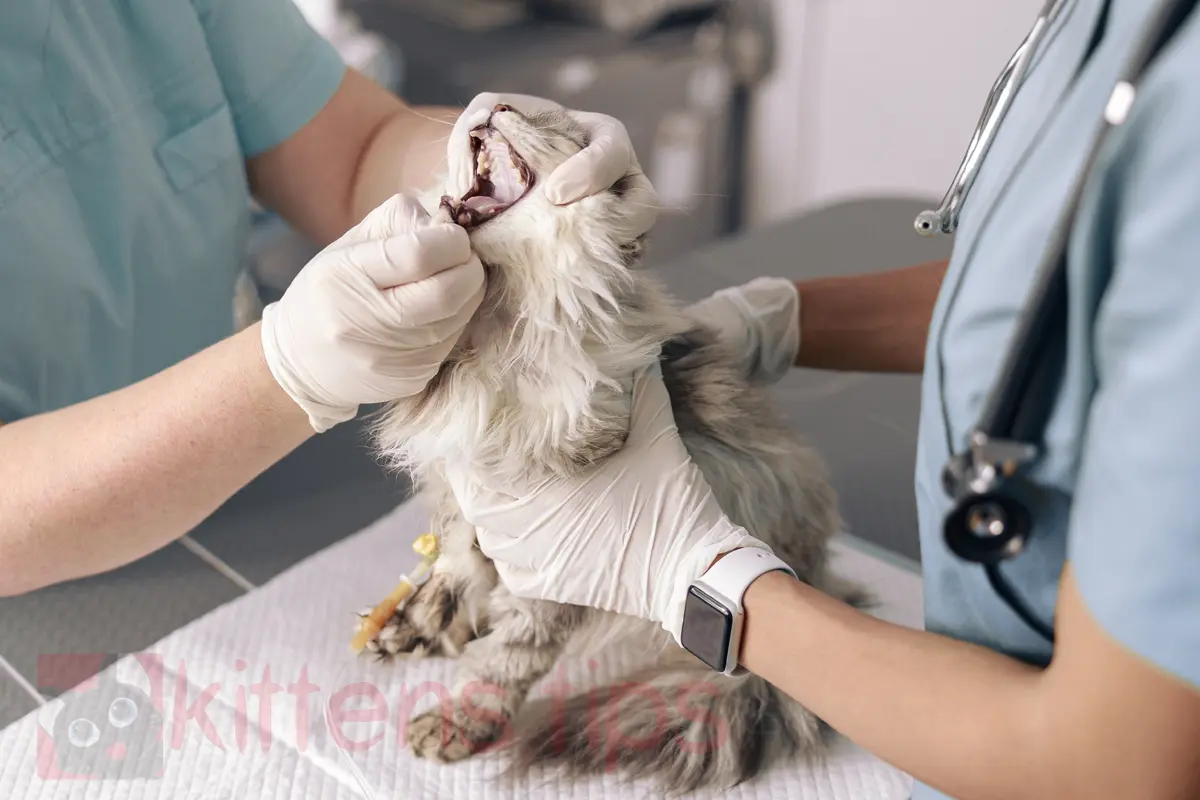When a cat’s mouth smells bad, you should not ignore this situation. The unpleasant odor of your cat’s breath should not be considered normal, and if it becomes persistent or extremely bothersome, it should attract attention.
Persistent bad breath in a cat may suggest the need for more rigorous dental care or may indicate the presence of an issue with internal organs.
Why does a cat’s mouth smells bad? Causes and Treatment.
Most often, halitosis in cats occurs due to dental or gingival problems, but the causes can be numerous, and treatment should be carried out after identifying the reason for the unpleasant odor in the cat’s mouth and breath.
Periodontal Disease
Periodontal disease is one of the most common causes of bad breath in cats. It results from the accumulation of bacterial plaque on the teeth, affecting the gums. Tartar resulting from the mineralization of bacterial plaque can lead to tooth loss, gingival bleeding, and pain while chewing.
Symptoms: Brown spots on the teeth, excessive salivation, difficulty in chewing, inflamed gums.
Treatment: Similar to humans, regular scaling, performed under anesthesia, can resolve this problem.
Gingivitis and stomatitis are causes of a bad odor in a cat’s mouth.
Gingivitis and stomatitis are inflammations of the mucous membrane in the mouth, affecting the gums, tongue, and other areas. These conditions can occur due to bacteria, viruses, or allergies.
Symptoms: The cat’s mouth smells bad, foul breath, brown spots on the teeth, inflamed gums.
Treatment: Addressing the underlying cause and, in some cases, dental procedures or medications prescribed by the veterinarian.
Diet can be the reason why the cat’s mouth smells bad
Nutrition can influence the smell of breath. Consuming certain foods, such as fish or liver-based foods, can contribute to the onset of bad breath. Sometimes, food particles left between the teeth can exacerbate the situation.
Solution: Modifying the diet can help alleviate the smell of breath. If the cat regularly consumes meat, it is advisable to temporarily remove it from the cat’s menu and replace it with dry food.
Kidney Diseases
The smell of ammonia or urine in a cat’s breath may indicate kidney problems. Kidney diseases are quite common in cats over 8 years old and may be accompanied by lethargy, weight loss, increased thirst, and frequent urination.
Treatment involves dietary changes, optimal hydration, and medication, depending on the type of kidney disease. A thorough consultation with a veterinarian is recommended.
Diabetes can be a cause of bad breath in cats
The sweet smell of breath may indicate the presence of diabetes in a cat. Other symptoms may include increased thirst and weight loss. Diabetes in cats can be successfully managed if identified in a timely manner.
Liver Diseases
Liver diseases in cats can cause a repugnant mouth odor, along with symptoms such as yellowing of the whites of the eyes and skin, lack of energy, vomiting, and diarrhea.
Treatment depends on the specific diagnosis, and a consultation with the veterinarian is essential.
Preventing bad breath
Maintaining good oral hygiene for a cat, including regular cleaning by a veterinarian or tooth brushing, can help avoid oral problems. There are also special cat food treats that can contribute to maintaining oral hygiene.
Regardless of the cause, if a cat’s mouth smells bad, consulting a veterinarian is crucial for identifying and managing the underlying issues with unpleasant breath in cats.
Must read: Why Does Hypersalivation Occur in Cats – Excessive Salivation
In conclusion, addressing the issue when a cat’s mouth smells bad is crucial for the overall health and well-being of our feline companions. Whether stemming from dental issues, kidney diseases, diabetes, or liver problems, identifying and managing the underlying causes is key. To effectively prevent and treat these olfactory challenges, maintaining proper oral hygiene, implementing dietary adjustments, and seeking regular veterinary consultations are essential for ensuring a healthy life for our beloved feline friends.
